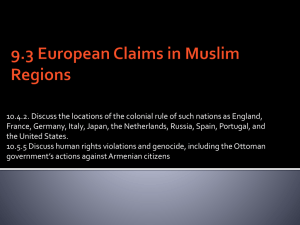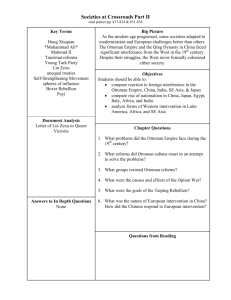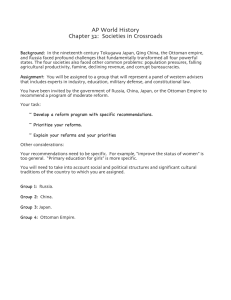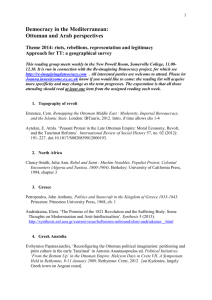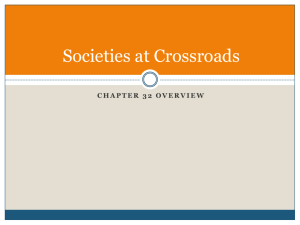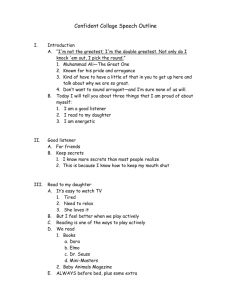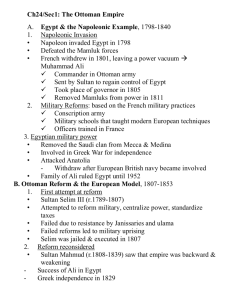Semester A Exam 2014: Review You should do your best to include
advertisement
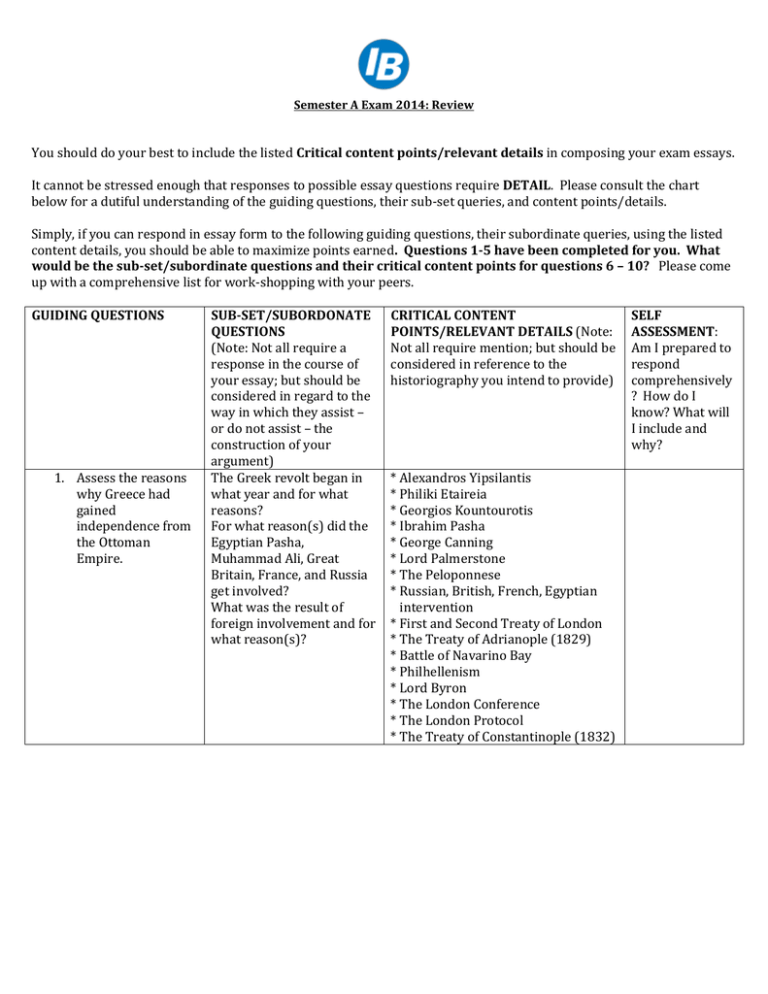
Semester A Exam 2014: Review You should do your best to include the listed Critical content points/relevant details in composing your exam essays. It cannot be stressed enough that responses to possible essay questions require DETAIL. Please consult the chart below for a dutiful understanding of the guiding questions, their sub-set queries, and content points/details. Simply, if you can respond in essay form to the following guiding questions, their subordinate queries, using the listed content details, you should be able to maximize points earned. Questions 1-5 have been completed for you. What would be the sub-set/subordinate questions and their critical content points for questions 6 – 10? Please come up with a comprehensive list for work-shopping with your peers. GUIDING QUESTIONS 1. Assess the reasons why Greece had gained independence from the Ottoman Empire. SUB-SET/SUBORDONATE QUESTIONS (Note: Not all require a response in the course of your essay; but should be considered in regard to the way in which they assist – or do not assist – the construction of your argument) The Greek revolt began in what year and for what reasons? For what reason(s) did the Egyptian Pasha, Muhammad Ali, Great Britain, France, and Russia get involved? What was the result of foreign involvement and for what reason(s)? CRITICAL CONTENT POINTS/RELEVANT DETAILS (Note: Not all require mention; but should be considered in reference to the historiography you intend to provide) * Alexandros Yipsilantis * Philiki Etaireia * Georgios Kountourotis * Ibrahim Pasha * George Canning * Lord Palmerstone * The Peloponnese * Russian, British, French, Egyptian intervention * First and Second Treaty of London * The Treaty of Adrianople (1829) * Battle of Navarino Bay * Philhellenism * Lord Byron * The London Conference * The London Protocol * The Treaty of Constantinople (1832) SELF ASSESSMENT: Am I prepared to respond comprehensively ? How do I know? What will I include and why? 2. For what reasons, and with what results, did Muhammad Ali succeed in establishing and maintaining himself as ruler of Egypt? How and why did Muhammad Ali consolidate power in Egypt? How and why did Ali gain favor/disfavor of the Egyptians? Which Egyptians? How and by what methods did Ali expand his power? How and why did Ali garner disdain of western Europe and the Ottoman Empire? How and why was disdain manifested against Ali? What was the result of Ali’s reign? * Selim III * Napolena Bonaparte’s military * The Mamlukes (Mamluke Massacre) * The Wahabis (Wahabi War) * The fellaheen * Ibrahim Pasha * The Greek War for Independence * Syria * The 1st and 2nd Turko-Egypto Wars * Monopolization and modernization * Egyptian cotton * Ali’s successors * French and British influence 3. How and why did the major powers intervene against Muhammad Ali in the 1830s? How did Ali threaten Ottoman territorial integrity and why? Why did the major powers find Ali’s endeavors threatening to their own stability? Which major powers were involved in EgyptoOttoman affairs during the reign of the Ali dynasty and why? 4. Assess the Ottoman Empire’s role in the outbreak of the Crimean War. Who was the Ottoman sultan during the Crimean War? Who were the major players in the Crimean War? What conditions compelled the major players towards war? Did the Czar Nicholas’ demands undermine Ottoman authority? What were the major battles in the Crimean War? What made the Crimean war unique and the first of its kind? What role did innovation play in the outbreak of the Crimean war or the players involved? * Selim III * Napolena Bonaparte’s military * The Mamlukes * The Wahabis * Ibrahim Pasha * The Greek War for Independence * Syria * The 1st and 2nd Turko-Egypto Wars * Monopolization and modernization * Egyptian cotton * London Convention of 1839 * Straits Convention of 1841 * The Treaty of Hunkiar Iskalessi * Ali’s successors * French and British influence * Alexandria railway * Beirut and Alexandria * The Suez Canal * Sultan Abdulmecid I * Czar Nicholas I * Napolean III * Lord Palmerston * Statford Canning (Stratford de Radcliffe) * Protection of Christians and Christian shrines in the Holy Land * The Vienna Conference * The invasion of the Danubian Provinces * The Black Sea * The Danube River * The Battle of Sinop * Military technology * The Vienna Note * Moldavia and Wallachia * Bessarabia * The Treaty of Paris (1856) 5. Assess the impact of the Tanzimat reforms upon the Ottoman Empire. 6. Examine the impact of major European powers on the Ottoman Empire between 1850 and 1880. 7. To what extent had communal tensions led to the outbreak of the Lebanese Civil War? What were the Tanzimat reforms? In what ways, specifically, did the Tanzimat reforms affect the Ottoman military, education system, legal system, political administration, socioeconomic structure, religious sects, as well as land distribution/use (particularly in Mount Lebanon)? What were the advantages and disadvantages of the Tanzimat reforms and to whom? *Re-organization * Modernization/Westernization * Mahmud II * Abdulmecid I * The Noble Rescript * The Gulhane Decree * The Imperial Rescript * The Tanzimat Land Code of 1858 * The Ottoman Penal Code of 1858 * Sharia Courts vs Milliya * The Janissaries * Ulema 8. To what extent did Lebanon gain autonomy as a result of the 1861 settlement? 9. Abdul Hamid II is best described as an “enlightened despot.” To what degree do you agree or disagree with this argument? 10. Analyze the impact of the CUP upon the Ottoman Empire during the first decades of the 20th century.
